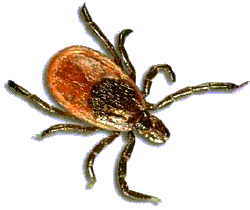|
Formally known as the
Jarisch-Herxheimber Reaction, or the Herxheimer reaction, it is named
after the doctors who first described the reactions to treatment for syphilis,
Adolph Jarisch
and Karl Herxheimer.
The term "Herxheimer
reaction" has expanded to include reactions to treatment for Lyme
disease, which is also caused by a spirochete, and generally, by those
who are familiar with the term, to the wide array of symptoms resulting
from the die-off of the organisms and resulting increased neurotoxin that
may take many months to abate.
Affectionately called
"herx" (as in, "I'm herxing bad today"), the term
is sometimes used to described the worsening of some or all symptoms that
were present before treatment with the use of any antibiotic, antiparasitic,
antifungal or antiviral prescribed for other parasitic (regardless of
organism type) infections. Herxing can also result in new symptoms
arising, very common in the treatment of Babesia, Bartonalla,
Borrelia, and Ehrlichia infections.
Herx symptoms are generally
different from those that are side-effects to active and inactive/inert
ingredients, making it difficult for the patient and treating physician
to determine if it is a drug reaction or herx. Along the lines of the
joke, "The surgery was a success but the patient died," the
severity of an individual symptom or total complex of herx symptoms in
a patient can be so extreme, especially when herx symptoms include extreme
pain, cognitive dysfunction, and depression, that patients frequently
would prefer death over continuing with the treatment.
Since there is risk
of enabling the organisms to develop antibiotic resistance, there is debate
over whether or not patients who are on long-term antibiotic treatment
should, when experiencing such extreme herxes, take a break for a couple
of days or not. Many find that taking a couple of days off results in
a rapid abatement of the herxes for that time. When they re-start the
drug protocol, they begin to herx right away, but often the intensity
is reduced to some degree, and so the protocol more tolerable. This break-restart
may be done a couple of times over the course of a long period of treatment,
with each successive resumption being more tolerable, thus the patient
can stay on the drugs for longer periods of time.
More information on
the herxheimer reaction can be found at:
Jarisch-Herxheimer
Reaction in Lyme Disease
Herxheimer
Reaction
|
